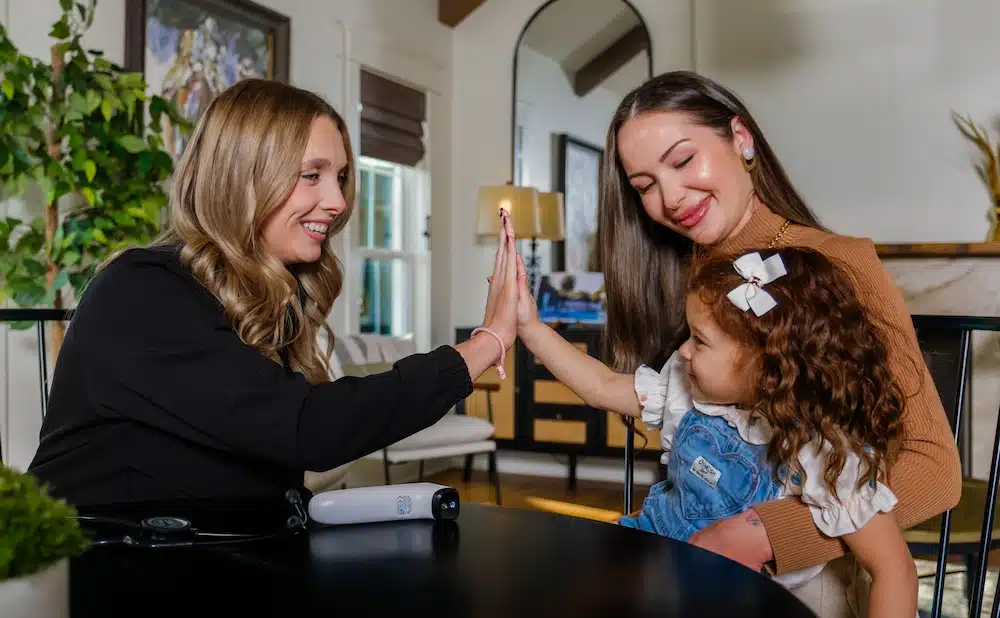
Concierge Primary Care At Your Doorstep
Experience primary care without leaving your home. Join our waitlist today and enjoy healthcare tailored to your needs–comfortably and conveniently.
Table of Contents
Reviving a Tradition: House Call Doctors
In the ever-evolving modern healthcare, a discipline once thought to be extinct is making a comeback. A practice that harks back to when doctors arrived at your doorstep with a black bag and a stethoscope reemerges as a symbol of patient-centered care, convenience, and a return to personalized medicine. This article delves into the resurgence, exploring the reasons behind this upturn and its benefits.
Join us on a journey through the past and into the present as we discover how this traditional approach is finding a renewed purpose in today’s healthcare landscape.
What Is Home-Based Primary Care?
Home-Based Primary Care, often referred to as HBPC, brings comprehensive and patient-centered primary care to the homes of individuals who face challenges accessing traditional medical facilities. This is beneficial for elderly patients or those with mobility issues. Home-based primary care is provided by doctors, nurse practitioners, and other specialists. The services may encompass preventive care, chronic disease management, medication management, and even palliative care.
The goal is to enhance patient outcomes, improve the quality of life, and reduce hospitalization rates, all within the comfort of the person’s environment. This approach aligns with the principles of patient-centered care. It acknowledges the importance of delivering services that best suit the needs and circumstances of each individual.
The History of House Calls
The history of house calls in medicine spans centuries. It’s a testament to the evolving nature of healthcare and the changing relationship between patients and providers.
Ancient Beginnings: The practice of physicians making house calls dates to ancient civilizations. In Greece, for example, the father of modern medicine, Hippocrates, emphasized the importance of understanding a patient’s environment and lifestyle. This required visits to patients’ homes, where physicians could gain a better understanding of their conditions.
The Middle Ages: Physicians often made house calls, as hospitals were few and far between. Knowledge was often passed down through families or apprenticeships, and practitioners traveled to provide care.
19th Century: Advances in medical knowledge and technology led to the rise of hospitals and clinics. House calls declined during this period, as hospitals provided a centralized location for medical treatment.
20th Century: The advent of medical technologies, such as X-rays, made it more challenging for physicians to provide comprehensive care in patients’ homes. Moreover, the growth of medical specialization and the prevalence of primary care clinics further reduced the need for house calls.
Resurgence in the 21st Century: Factors contributing to this revival include a renewed focus on patient-centered care, technological advancements, and a growing elderly population. In the United States and other countries, there has been a revival of house call practices in primary, palliative, and hospice. These are often enhanced by modern technology, with healthcare providers having access to electronic records and telemedicine.
Modern House Calls: The integration of technology and the personalization of care. Doctors can use telemedicine to consult with patients remotely, order tests, and access medical records. These advances, along with the emphasis on patient comfort and convenience, are bringing house calls back into the healthcare landscape.
From bygone eras to the present day, the practice has evolved in response to medical knowledge, technological advancements, and patient needs. While the traditional image of a doctor with a black bag may have faded, the concept has adapted to the modern era. It is valuable in providing healthcare to those who need it most.
Why Did Doctors & Physicians Stop Making House Calls?
First and foremost, advances in medical technology and the establishment of well-equipped healthcare facilities have made it more feasible for patients to seek medical attention in clinics, hospitals, or specialized diagnostic centers. These facilities offer state-of-the-art equipment, diagnostic tools, and an array of medical specialists, making it possible to provide comprehensive care.
Furthermore, the demand has grown, leading to an increase in the patient load, which necessitated streamlining medical practices. House calls can be burdensome and more expensive in terms of logistics and costs, including travel time, the need for a portable medical kit, and insurance stipulations.
Despite the decline, there remains a recognition of the value of patient-centered care. Telemedicine and virtual consultations have emerged as a modern alternative, allowing for remote patient-doctor interactions offering a compromise. This enables healthcare providers to address patients’ needs without physical presence, balancing traditional and contemporary healthcare delivery methods.

The Benefits of House Calls
- Convenience and Comfort: House calls eliminate the time to travel to a medical facility, ensuring that individuals receive care in their homes. This is valuable for those with mobility issues, chronic illnesses, or transportation challenges.
- Personalized and Comprehensive Care: Healthcare providers gain a comprehensive understanding of a patient’s health by assessing their living conditions, social support systems, and routines. This leads to more accurate diagnoses and tailored treatment plans, enhancing the quality of care.
- Reduced Anxiety: House calls create a more relaxed and familiar environment, reducing stress and helping patients feel more at ease during their appointments.
- Improved Access to Care: House calls to bridge the gap between limited access to healthcare and medical attention. This is valuable for individuals in rural or remote areas, providing medical care and preventive services they might otherwise lack.
- Enhanced Monitoring and Follow-Up: This is beneficial in long-term or palliative care scenarios. Healthcare providers can monitor patients’ progress and ensure their medical, emotional, and spiritual needs are met, promoting a higher quality of life and care continuity.
How to Find At-Home Care & House Call Services
Begin by consulting your primary care physician or specialist. You may also explore local healthcare networks and agencies. A convenient approach is to search online using keywords related to your needs, such as “home-based primary care” or “house call doctors.” Verify the qualifications and credentials to guarantee quality care for yourself and your loved ones.
The practice of doctors making house calls, once considered a fading tradition, is experiencing a remarkable resurgence. This is driven by recognizing the value of patient-centered care, advanced technology, and the evolving needs of an aging population. While it may not be the ubiquitous norm of the past, house calls are relevant and impactful in primary care, palliative care, and end-of-life care. They provide patients with unparalleled convenience, individualized attention, and access to care that accommodates their circumstances.
Call Medical House Calls to Make an Appointment
As healthcare evolves, house call doctors exemplify how medicine can adapt and improve to meet patients’ needs, reaffirming the age-old principle that healthcare should always prioritize the well-being and comfort of those it serves.
Consider contacting Medical House Calls. With our healthcare professionals, same-day and next-day appointments are just a call or text away, ensuring you receive prompt and effective treatment. The services vary in scope, so it’s essential to discuss your requirements and preferences.
Family & Individual Care Available
Enjoy personalized primary care customized for families and individuals, delivered conveniently at home. Discover flexible plans designed to keep everyone healthy and thriving.




